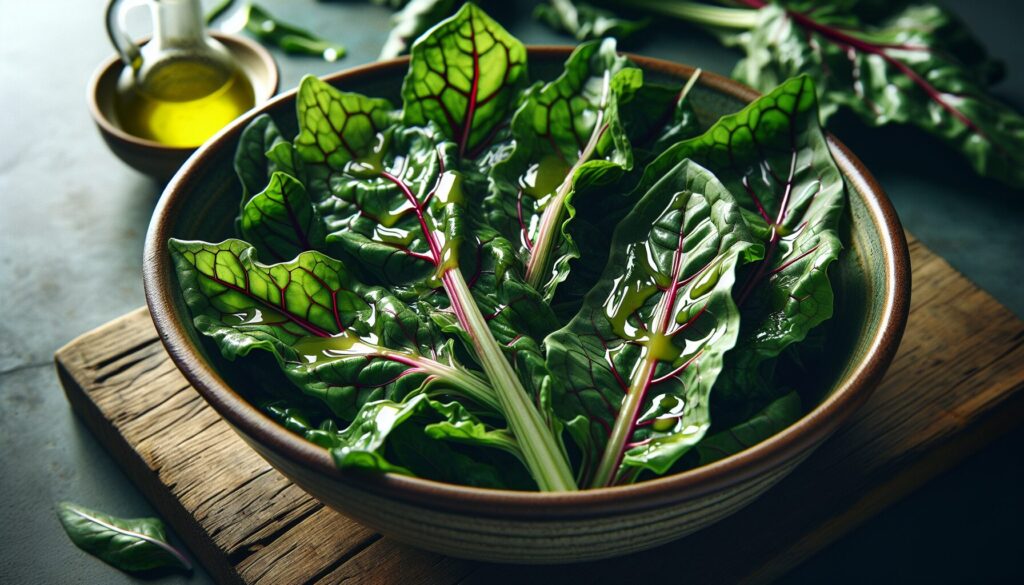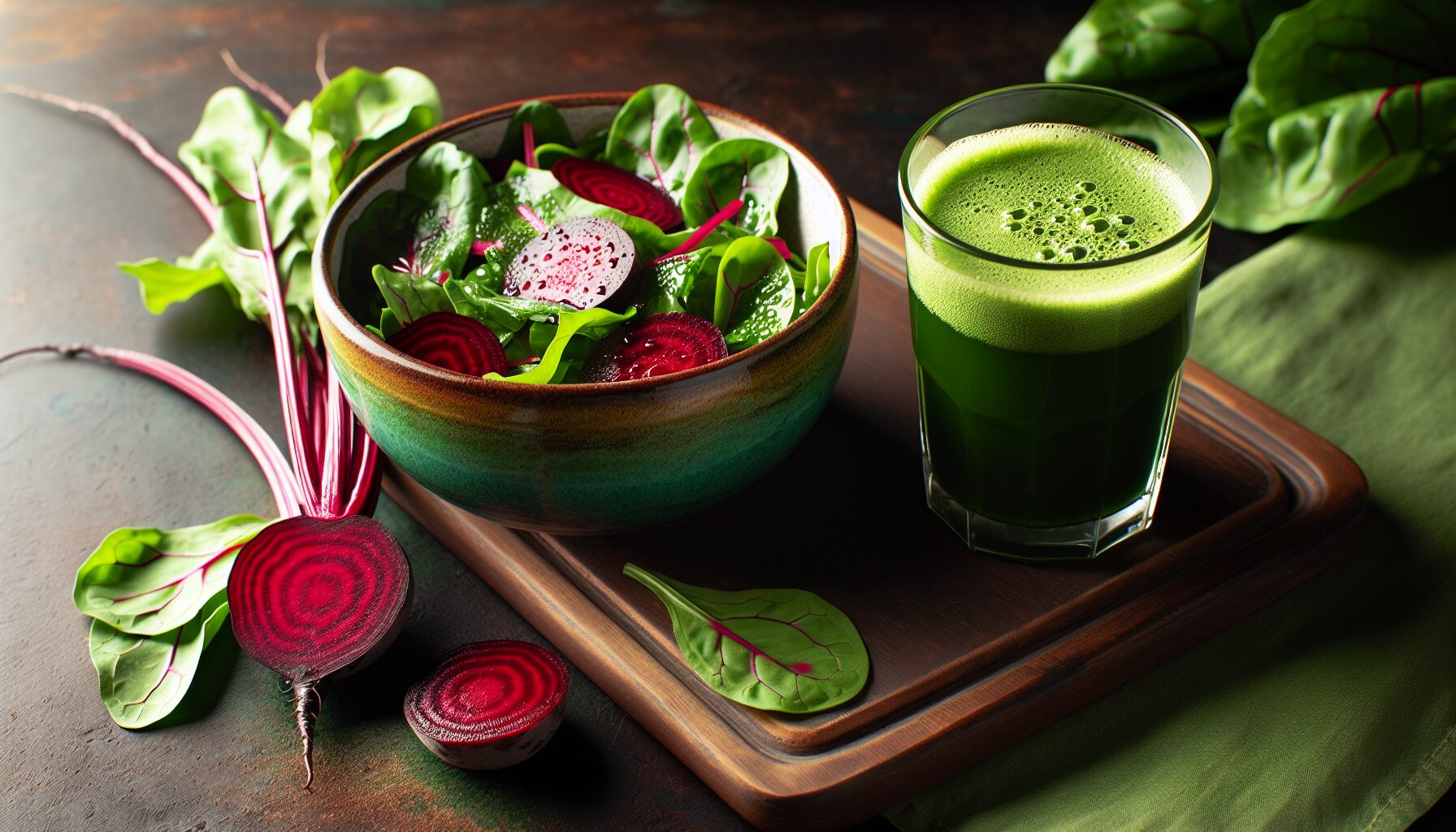
Sugar Beet Leaves Benefits And Overall Effects Of Beet Greens
You may be familiar with sugar beet or beetroot but may not be familiar with the leaves of sugar beet or beet greens and their potential benefits for our health. Beet greens or sugar beet leaves refer to the leafy stem or foliage of the beetroot or sugar beet plant.
Sugar beet or beet greens can be eaten raw. The leaves of sugar beet are rich in some health promoting nutrients that could be included in our diet. Beet greens are also low in anti nutritional compounds such as tannins, phytate and oxalates which can prevent nutrient absorption.
Some very practical ways to introduce sugar beet leaves into our diet include juicing and as a side salad. These are also some of the best ways to integrate key nutrients into your diet without heat caused degradation.
Beet greens or sugar beet leaves may lack protein or energy producing nutrients but they are packed with antioxidant compounds and essential trace nutrients. Some of these include zeaxanthin and manganese. Researched potential health benefits from eating sugar beet leaves or beet greens regularly may include a revitalized antioxidant capacity and so they could support improvements in heart health.
In this article the potential health benefits of sugar beet or beetroot leaves will be considered in relation to their nutrient content.

Nutritional Content And Benefits Of Sugar Beet Leaves
Sugar beet leaves contain really high amounts of some nutrients that could help to support our overall wellbeing and health. The leaves of sugar beet are rich in vitamin A, beta carotene, manganese, iron and zeaxanthin. Sugar beet leaves are also rich in dietary fibres that can support our gut health.
The antioxidant powerhouse of sugar beet leaves is vital to the nutritional health benefits of this food. One study with red beet leaf extract found that sugar beet leaves could improve body antioxidant levels. There is also evidence suggesting that sugar beet leaves may encourage healthy weight loss. Other studies have reported similar things. Including elevated levels of vital antioxidants and an increase in HDL. While beet leaves may also reduce levels of oxidised LDL.
Below the main benefits of beet greens or sugar beet leaves are identified from its unique nutritional content.
Vitamin A
The total vitamin A content of beet greens or sugar beet leaves as compounds with retinol equivalent activity is 316µg per 100 grams. Our RDA for vitamin A is between 700µg and 900µg per day. This means that beet greens or sugar beet leaves provide about 40% of your vitamin A RDA per 100 grams of produce.
Retinol or pure vitamin A is an antioxidant that supports optimal eye health. Vitamin A is also required for our colour and low light vision. Vitamin A sufficiency also supports optimal fertility in men and women. This vitamin A could also support optimal brain functioning and development via antioxidant protection.
You can read our articles on the benefits of vitamin A for brain health and male fertility here.
The regular consumption of beetroot leaves or sugar beet leaves may provide health benefits through vitamin A intake such as improved fertility or support with healthy vision. One study has showed that beetroot leaf or beet greens extracts show promise in protecting testicular tissue from oxidative stress.
Beta Carotene
Beet greens or sugar beet leaves also contain beta carotene. Sugar beet leaves contain 3794µg of beta carotene per 100 gram serving. There is an RDA for vitamin A but there is not really an RDA for beta carotene.
Beta carotene is essentially another form of vitamin A and can be converted into usable vitamin A. Beta carotene is a strong antioxidant just as vitamin A is. This antioxidant compound cleanses the body of energetic free radicals that cause local or systemic inflammation and sustains conditions for life.
Beta carotene protects cells from DNA damage and could also support the detoxification process in the liver. Research also suggests that beta carotene could be an immunostimulant that promotes the production of natural killer cells and lymphocytes.
Beet greens as red beet leaf supplements have also been shown to reduce oxidative damage to key circulating lymphocyte cells.

Zeaxanthin
Zeaxanthin is a nutritional carotenoid and derivative of beta carotene. Humans can’t produce this nutrient and so zeaxanthin must be consumed as part of our diet. Once consumed this pigment can accumulate in the skin and eyes.
You can find zeaxanthin in plant pigments. Zeaxanthin has various potential health benefits that centre around antioxidant qualities. Some of the many reported health effects or benefits of this carotenoid include intense protection from light or UV damage to the body and oxidative stress influenced neurological conditions.
Lutein and zeaxanthin are both thought to play roles in the prevention of age related eye diseases including macular degeneration or cataracts. Zeaxanthin may have preventative benefits against cancer.
There is estimated to be around 1503µg of lutein and zeaxanthin per 100 grams of beet greens. These nutrients are usually determined together and share many similar properties. These are both fat soluble nutrients. So be sure to consume your beet greens with some healthy fats.
Zeaxanthin and lutein are both fat soluble antioxidants. They have been shown to protect the activity of brown adipose tissues via simultaneous mitochondrial growth and preservation.
Elevated levels of zeaxanthin could therefore add to the potential health benefits of eating sugar beet greens or beet greens via skin cancer prevention and eye health support.
Vitamin C
There seems to be an incredible antioxidant content within beet greens and sugar beet leaves. In total there is 30mg of vitamin C per 100 grams of beet greens. This is very phenomenal for a green leafy vegetable. Our suggested RDA is about 80mg or so. That means you can obtain about 30% of your vitamin C intake from 100 grams of sugar beet leaves.
Vitamin C is one of our most important vitamins. This water soluble vitamin ensures that our cells are under minimal oxidative stress on a day to day basis. Chronic oxidative stress leads to excess inflammation. This could cause damage within the body and premature cell ageing. Chronic inflammation also leads to chronic diseases.
Vitamin C is vital for maintaining our overall wellness because of cell stress cleansing actions within the body. Vitamin C is a cancer preventative vitamin. This vitamin is really important for optimal wound healing and immune system functioning. Healthy vitamin C levels also support connective tissue production that is rich in collagen . This could therefore improve appearance of skin ageing.
Vitamin E
Another antioxidant nutrient you can find in this green leafy vegetable is vitamin E. There is about 1.5mg of vitamin E in sugar beet leaves per 100 grams of produce. Your overall day to day requirement of vitamin E is 17mg.
This vitamin is one of the lowest in nutrient density that you can obtain from beet greens. Vitamin E is worth an inclusion because of its nutritional relevance to the other antioxidants in sugar beet leaves. Vitamin E is an essential fat soluble antioxidant vitamin.
This vitamin prevents prevent free radical damage to cells and their fatty acids. Minimising fatty acid oxidative damage is considered to be an important factor in preventing pre mature ageing. Vitamin E is thought to be important for skin health as an antioxidant. This means that one of the nutritional benefits of eating beet greens may be added skin health support.
Healthy levels of vitamin E may assist with reducing blood vessel damage or atherosclerosis from oxidised fatty acid plaques. Eating beet greens could therefore support heart health.
There is also some suggestion that vitamin E could play a role in maintaining hair health. One of the additional nutritional benefits of eating beetroot leaves of beet greens may be hair health support.

Vitamin K
In 100 grams of sugar beet leaves there is 400µg of vitamin K. This is an absolutely massive amount of this fat soluble vitamin. Sugar beet leaves or beet greens really push their credentials here as a vitamin K dense food. This is available for the body to absorb as natural phylloquinone.
Vitamin K is not required in large amounts and is essential for wound healing and blood clotting. Regular consumption of beet greens or beetroot leaves can therefore provide health benefits via supporting the wellbeing of our blood vessels and healing of body tissues.
Beetroot Phenolics
Sugar beet leaves also contain high quantities of antioxidant polyphenols. A compound called vitexin is thought to be the highest in density in beet greens. Vitexin is a flavonoid glycoside. Initial studies with this compound suggest that vitexin is a tumor preventative and shows strong antioxidant potential. Vitexin also has antiviral properties and may assist with skin wound healing in a similar means to vitamin K.
A study with beet greens stalks shows that vitexin shows promise as a calming compound on liver inflammation or oxidative stress and could be of assistance for sufferers of obesity.
Other phenolic compounds identified in sugar beet leaves include gallic acid and ferulic acid. Polyphenols have demonstrated health benefits such as antioxidant, antibacterial and anticancer. Eating beet greens could therefore provide these health benefits. One study has showed that beet greens have a higher antioxidant profile and phenolic value than vegetables such as spinach, broccoli, carrot, onion, and celery.

Betalains
Red beetroots are a rich source betalains. Betalains have antioxidant activity and could protect tissues from free radical related disorders. Beet greens also contain betanin and this adds to the antioxidant benefits of this nutrient dense food. This is the main betacyanin or betalain compound and they are related to anthocyanins.
Studies have found that betanin has antioxidant effects against cell membrane oxidation and LDL oxidation. An inclusion of betanin in the diet from beet greens or beetroot leaves may have benefits in protecting heart health.
Vitamin B2
Vitamin B2 is a mitochondrial supporting compound. This B vitamin supports energy production and healthy growth. Vitamin B2 is essential for healthy metabolism and supports the activities of other enzymes too. Levels of riboflavin are linked to cognitive functioning and fatigue.
There is a decent level of vitamin B2 in sugar beet leaves for a leafy vegetable. The total riboflavin or vitamin B2 content of beet greens is 0.220mg per 100 grams. Our RDA of vitamin B2 is between 1.1mg and 1.3mg a day. Sugar beet leaves therefore offer about 20% of an RDA for Vitamin B2 per 100 grams.
The regular consumption of sugar beet leaves or beetroot leaves may therefore have benefits in promoting healthy brain functioning and supporting energy production.
Riboflavin has also been associated with hair loss. This means that one of the nutritional benefits of eating beet greens or beetroot leaves may be hair health support.

Potassium
There is 762mg of potassium per 100 grams of beet greens. A good serving of sugar beet leaves can therefore cover a very large part of your suggested RDA for potassium. Per 100 grams this is over a third of the suggested potassium intake.
Potassium is an essential electrolyte that is needed in large amounts in the body. This mineral is needed for healthy muscular movements and nerve transmissions. Elevated potassium levels are also linked with a highly reduced risk of strokes.
Manganese
This mineral is very important for our overall metabolism. Manganese supports various enzymes and is a key factor in growth regulation. Manganese supports healthy blood glucose levels, hormone production and bone formation.
This mineral reduces risk of cancer through a role in superoxide dismutase production. This antioxidant enzymes prevents oxidative damage from free radicals. Current research supports findings that manganese could improve athletic performance.
You can obtain 0.391mg of manganese per 100 grams of sugar beet greens. This is a significant amount and covers about 20% of our manganese RDA per 100 grams.
The regular consumption of beet greens or sugar beet leaves could have potential benefits in reducing cancer risk and supporting healthy athletic performance via a healthy intake of manganese.
Magnesium
Magnesium is a very important nutrient for the body. This mineral is an essential electrolyte and is also very important for optimal muscle relaxation. Per 100 grams of sugar beet leaves you can obtain about 70mg of magnesium. This supports about 20% of our RDA per 100 grams of beetroot leaves.
Healthy levels of magnesium are also needed for healthy energy, protein and DNA production in the body. Magnesium regulates the production of nerve transmitters such as serotonin.
Some potential health benefits of sugar beet green consumption may therefore include support of healthy muscle functioning via improved magnesium intake.
Iron
Beet greens provide 2.57mg of iron per 100 grams and this supports about 20% of our RDA per 100 grams.
A healthy and regular iron intake is important for red blood cell formation. Iron maintains healthy levels of oxygen throughout the body. Oxygen is vital for animal life. Optimal levels of iron therefore support healthy blood flow and providing our muscles or brain with vital nutrients.
Beet greens or sugar beet leaves therefore provide potential health benefits for muscle and brain function through iron status.

Copper
There is 0.19mg of copper per 100 grams of sugar beet leaves. This covers about 14% of our RDA per 100 grams.
Copper is needed by the mitochondria to support key energy producing enzymes. This trace mineral is required to form red blood cells.
A deficiency in copper can cause red blood cell deficient anaemia and excessive tiredness. Copper is very important for brain health. Copper is needed to maintain the myelin coatings of nerves that support quick nerve signalling.
Beet green leaves can therefore support our copper intake and provide health benefits such as the reduction of fatigue.
Dietary Fibre
Beet greens or sugar beet leaves contain a large amount of dietary fibre. To put a figure on this there is 3.7grams of dietary fibre per 100 grams of produce.
This high dietary fibre content is because sugar beet leaves are a green leafy vegetable. They are rich in beta glucose based molecules or complex carbohydrates such as cellulose and hemi cellulose. Humans can not digest these molecules but our gut microbes love them. Prebiotic dietary fibres support our health promoting gut bacteria and an improved relationship with them.
A lack of dietary fibre can cause Gut dysbiosis. This is where there is an imbalance of beneficial to harmful gut microbes in the gut and this can lead to systemic inflammation. Gut bacteria therefore have the potential to influence our health in many different ways.
Gut microbes are able to contribute to inflammatory skin conditions such as such as eczema or acne. Some harmful bacteria can cause to huge increases in skin sebum production. Beneficial gut bacteria can improve immune responses, lower inflammation in the gut and support brain health.
Beet greens or edible beetroot leaves therefore have the potential to provide benefits for our skin and brain health through improvements in dietary fibre intake.
While they do not seem to contain nutrients initially a closer examination of beet greens shows they have various nutritional benefits to potential support our overall wellness. Some core benefits of eating sugar beet leaves may include elevated antioxidant or vitamin K levels that may improve fertility and cellular healing.

Summary
Beet greens are the foliage of the beetroot or sugar beet plant and these can be eaten raw in salads or juices. They are a deceptively nutrient dense food.
Beet greens or sugar beet leaves are high in antioxidant compounds and minerals. These nutrients could help to support our overall wellbeing and health.
Sugar beet leaves or beetroot leaves are rich in vitamin A and beta carotene. These powerful antioxidant molecules support optimal eye health and fertility. Antioxidant compounds support our wellbeing via cleansing the body of energetic free radicals that cause local or systemic inflammation. Beta carotene could support the immune cell production and protect the body from DNA damage.
Zeaxanthin is a biochemically similar carotenoid to beta carotene. Sugar beet leaves are a rich source of lutein and zeaxanthin. The fat soluble antioxidant zeaxanthin accumulates in the skin and eyes. Zeaxanthin has reported health benefits such as protecting the skin and eyes from damage. Zeaxanthin may protect brown fat tissue activity through effects on mitochondria.
Sugar beet leaves are rich sources of other important antioxidants such as vitamins C and E. These support reductions in attributes of ageing and may improve heart health.
Beet greens also support healthy intakes of minerals such as manganese and iron. Manganese improves production of the antioxidant enzyme superoxide dismutase and iron supports red blood cell production. Vitamin K is one of the most nutrient dense vitamins in sugar beet leaves and supports wound healing.
Sugar beet leaves contain a large amount of dietary fibre. Through gut microbe enhancement this could provide potential health benefits such as reduced systemic inflammation.
Regularly eating sugar beet leaves may therefore provide various nutritional benefits to support our overall wellness.
For more interesting articles see the main articles page below.





